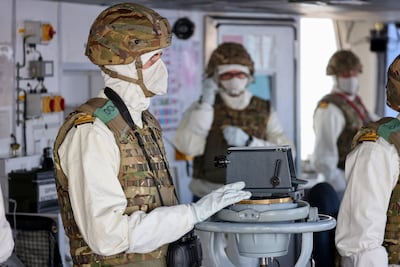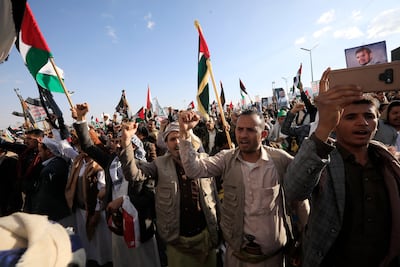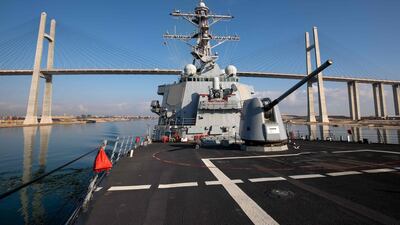Live updates: Follow the latest news on Israel-Gaza
Yemen's Houthi rebels claimed responsibility for a barrage of drones and missiles aimed at a US warship in the Red Sea on Tuesday, which also apparently targeted commercial ships.
It is the first time the group has admitted directly attacking US naval forces, although it has previously threatened the American navy following the outbreak of the Israel-Gaza war on October 7.
The US military's Central Command said the “complex attack” was thwarted.
American and British jets and warships shot down drones and anti-ship missiles at about 9pm, the US military said.
The Houthis said the attacks were a "preliminary response" to the killing of 10 of their militants by US helicopters last week.
“The naval forces, the missile force, and the drone force of the Yemeni armed forces carried out a joint military operation with a large number of ballistic and naval missiles and drones, targeting an American ship that was providing support to the Zionist entity,” Houthi spokesman Yahya Saree said on Wednesday on X, formerly known as Twitter.
The UK said seven attack drones had been fired at the Royal Navy’s Type 45 destroyer HMS Diamond, all of which it had shot down.
Britain's Ministry of Defence released an image from within the cockpit of HMS Diamond as it apparently engaged the drones.

The assault – the largest so far from the Houthis – came the night before a UN Security Council vote on the threat posed by the rebels.
A draft resolution being put to vote on Wednesday was expected to condemn the group's threat to “navigational rights and freedoms as well as regional peace and security”.
The direct attack on a US ship could hasten calls for tougher action against the group, following a call from France's ambassador to the UN, Nicolas de Riviere, for the Security Council to meet and discuss the crisis.
The draft UN resolution would demand the immediate release of the first ship the Houthis attacked, the Galaxy Leader, a Japanese-operated cargo ship with links to an Israeli company, which the group seized on November 19 along with its crew.
The multinational crew of the ship, who are from the Philippines, Ukraine, Bulgaria and Mexico, among other countries, are still being held by the rebels.
The Iran-backed Houthis fired 18 one-way attack drones, two anti-ship cruise missiles and one anti-ship ballistic missile towards international shipping lanes where dozens of merchant vessels were at sea, the Central Command said.

Will the US and UK respond?
UK Defence Secretary Grant Shapps suggested a response was imminent in a media briefing on Wednesday.
"Watch this space," he said, when asked if the US-led task force would now fulfil its threats of armed response against the Houthis.
Mr Shapps added he had been in touch with fellow military leaders, including in Saudi Arabia, and “we are all agreed in one voice, this cannot continue, and we won't allow it to continue. Watch this space.”
Last week, the US, the UK, Bahrain and other countries demanded that the Houthis halt their attacks in the Red Sea and warned of consequences if they continued their destabilising actions.
“The Houthis will bear the responsibility of the consequences should they continue to threaten lives, the global economy, and free flow of commerce in the region's critical waterways,” they said.
That message should be “taken very seriously”, Pentagon press secretary Maj Gen Patrick Ryder said on Tuesday, shortly before the latest Houthi attack was made public.
But the draft UN resolution, seen by The National, contains less threatening language, calling for “caution and restraint to avoid further escalation of the situation in the Red Sea and the broader region”.
It also calls for “enhanced diplomatic efforts by all parties to that end, including continued support for dialogue and Yemen’s peace process under the UN auspices”.
Earlier on Tuesday, the administration of US President Joe Biden denied Republican claims that it was not doing enough to counter Houthi attacks.
Some US allies have expressed caution about Operation Prosperity Guardian – the mission to protect shipping in the waterway – turning from a protective mission to a direct conflict with the Houthis.
Italy's defence minister said on Wednesday that the group must be stopped without triggering a new war.
“It is a huge problem, it is a consequence of other [war] outbreaks. I would not like to open a third front of war at this time,” Guido Crosetto told Reuters, in a reference to current conflicts in Ukraine and Gaza.

Houthi drone and missile attacks
Last month, the Houthis launched 14 drones against shipping, including naval coalition vessels. While drones have been used against ships before, in Ukraine war, and by Iran for targeting ships with links to Israel, the latest drone attacks are an unprecedented use of the weapons at sea.
American forces used F/A-18s launched from the USS Dwight D Eisenhower aircraft carrier and interceptors from three other ships. A British Royal Navy guided-missile destroyer was also involved.
“This is the 26th Houthi attack on commercial shipping lanes in the Red Sea since November 19. There were no injuries or damage reported,” the Central Command said.
The most deadly clash occurred on December 31, when US helicopters repelled an attack by Houthi small boats against a merchant ship, the Maersk Hangzhou. The Houthis said 10 militants were killed in the three boats that were destroyed.
The Houthis are backed by Iran, which has been accused of enabling the attacks.
Mr Shapps also said he had "no doubt whatsoever" that "the Iranians are heavily behind what the Houthis are doing."
While he said he could not divulge sensitive information, Mr Shapps added that “it's fair to assume a very large amount of Iranian influence is guiding what we're seeing happening”.
“They're helping to guide these attacks, that is certainly the case and we are being very, very clear with Tehran, that this is not acceptable,” he said.
Shipping disrupted
The attacks have caused major disruption to global shipping.
Major companies have chosen to avoid the Red Sea and seek longer but safer routes via southern Africa and round the Cape of Good Hope.
Europe-based MSC, Maersk, CMA CGM and Hapag-Lloyd, and Asia-based Cosco Shipping, HMM and Evergreen Line, are among the companies to have suspended their Red Sea shipping.
Tanker transits through the Suez Canal, at the top of the Red Sea, have fallen by 14 per cent since the first attacks in November.
The Red Sea is usually a crucial trade route through which a significant portion of the world's oil supply is transited.
Carolina Klint, chief commercial officer for Europe at Marsh McLennan, said it was “impossible” to use the Red Sea shipping lanes following the most recent attack.
“The question really is how do we support the global shipping industry in addressing this and potentially identifying alternatives because it is becoming almost impossible to take container ships through the Suez Canal without risking the lives of the crew, without putting them in harm's way,” she told the launch of a World Economic Forum report.
“It’s not only about protecting the biggest ship or protecting the containers but first and foremost … it's the human lives at risk. It is also becoming increasingly difficult because it gets difficult to find an insurer that is willing to take a risk on a ship.”

